- Home
- Henry James
The Europeans Page 6
The Europeans Read online
Page 6
CHAPTER VI
Going of an afternoon to call upon his niece, Mr. Wentworth more thanonce found Robert Acton sitting in her little drawing-room. This was inno degree, to Mr. Wentworth, a perturbing fact, for he had no senseof competing with his young kinsman for Eugenia's good graces. MadameMunster's uncle had the highest opinion of Robert Acton, who, indeed, inthe family at large, was the object of a great deal of undemonstrativeappreciation. They were all proud of him, in so far as the chargeof being proud may be brought against people who were, habitually,distinctly guiltless of the misdemeanor known as "taking credit." Theynever boasted of Robert Acton, nor indulged in vainglorious reference tohim; they never quoted the clever things he had said, nor mentioned thegenerous things he had done. But a sort of frigidly-tender faith inhis unlimited goodness was a part of their personal sense of right; andthere can, perhaps, be no better proof of the high esteem in which hewas held than the fact that no explicit judgment was ever passed uponhis actions. He was no more praised than he was blamed; but he wastacitly felt to be an ornament to his circle. He was the man of theworld of the family. He had been to China and brought home a collectionof curiosities; he had made a fortune--or rather he had quintupled afortune already considerable; he was distinguished by that combinationof celibacy, "property," and good humor which appeals to even themost subdued imaginations; and it was taken for granted that he wouldpresently place these advantages at the disposal of some well-regulatedyoung woman of his own "set." Mr. Wentworth was not a man to admit tohimself that--his paternal duties apart--he liked any individual muchbetter than all other individuals; but he thought Robert Acton extremelyjudicious; and this was perhaps as near an approach as he was capable ofto the eagerness of preference, which his temperament repudiated as itwould have disengaged itself from something slightly unchaste. Actonwas, in fact, very judicious--and something more beside; and indeed itmust be claimed for Mr. Wentworth that in the more illicit parts ofhis preference there hovered the vague adumbration of a belief thathis cousin's final merit was a certain enviable capacity for whistling,rather gallantly, at the sanctions of mere judgment--for showing alarger courage, a finer quality of pluck, than common occasion demanded.Mr. Wentworth would never have risked the intimation that Acton wasmade, in the smallest degree, of the stuff of a hero; but this is smallblame to him, for Robert would certainly never have risked it himself.Acton certainly exercised great discretion in all things--beginning withhis estimate of himself. He knew that he was by no means so much of aman of the world as he was supposed to be in local circles; but it mustbe added that he knew also that his natural shrewdness had a reachof which he had never quite given local circles the measure. He wasaddicted to taking the humorous view of things, and he had discoveredthat even in the narrowest circles such a disposition may find frequentopportunities. Such opportunities had formed for some time--that is,since his return from China, a year and a half before--the most activeelement in this gentleman's life, which had just now a rather indolentair. He was perfectly willing to get married. He was very fond ofbooks, and he had a handsome library; that is, his books were much morenumerous than Mr. Wentworth's. He was also very fond of pictures; but itmust be confessed, in the fierce light of contemporary criticism, thathis walls were adorned with several rather abortive masterpieces. He hadgot his learning--and there was more of it than commonly appeared--atHarvard College; and he took a pleasure in old associations, which madeit a part of his daily contentment to live so near this institution thathe often passed it in driving to Boston. He was extremely interested inthe Baroness Munster.
She was very frank with him; or at least she intended to be. "I amsure you find it very strange that I should have settled down in thisout-of-the-way part of the world!" she said to him three or four weeksafter she had installed herself. "I am certain you are wondering aboutmy motives. They are very pure." The Baroness by this time was an oldinhabitant; the best society in Boston had called upon her, and CliffordWentworth had taken her several times to drive in his buggy.
Robert Acton was seated near her, playing with a fan; there werealways several fans lying about her drawing-room, with long ribbons ofdifferent colors attached to them, and Acton was always playing withone. "No, I don't find it at all strange," he said slowly, smiling."That a clever woman should turn up in Boston, or its suburbs--that doesnot require so much explanation. Boston is a very nice place."
"If you wish to make me contradict you," said the Baroness, "vous vousy prenez mal. In certain moods there is nothing I am not capableof agreeing to. Boston is a paradise, and we are in the suburbs ofParadise."
"Just now I am not at all in the suburbs; I am in the place itself,"rejoined Acton, who was lounging a little in his chair. He was, however,not always lounging; and when he was he was not quite so relaxed as hepretended. To a certain extent, he sought refuge from shyness inthis appearance of relaxation; and like many persons in the samecircumstances he somewhat exaggerated the appearance. Beyond this, theair of being much at his ease was a cover for vigilant observation. Hewas more than interested in this clever woman, who, whatever he mightsay, was clever not at all after the Boston fashion; she plunged himinto a kind of excitement, held him in vague suspense. He was obliged toadmit to himself that he had never yet seen a woman just like this--noteven in China. He was ashamed, for inscrutable reasons, of the vivacityof his emotion, and he carried it off, superficially, by taking, stillsuperficially, the humorous view of Madame Munster. It was not at alltrue that he thought it very natural of her to have made this piouspilgrimage. It might have been said of him in advance that he was toogood a Bostonian to regard in the light of an eccentricity the desire ofeven the remotest alien to visit the New England metropolis. This was animpulse for which, surely, no apology was needed; and Madame Munsterwas the fortunate possessor of several New England cousins. In fact,however, Madame Munster struck him as out of keeping with her littlecircle; she was at the best a very agreeable, a gracefully mystifyinganomaly. He knew very well that it would not do to address thesereflections too crudely to Mr. Wentworth; he would never have remarkedto the old gentleman that he wondered what the Baroness was up to. Andindeed he had no great desire to share his vague mistrust with any one.There was a personal pleasure in it; the greatest pleasure he had knownat least since he had come from China. He would keep the Baroness, forbetter or worse, to himself; he had a feeling that he deserved toenjoy a monopoly of her, for he was certainly the person who had mostadequately gauged her capacity for social intercourse. Before long itbecame apparent to him that the Baroness was disposed to lay no tax uponsuch a monopoly.
One day (he was sitting there again and playing with a fan) she askedhim to apologize, should the occasion present itself, to certain peoplein Boston for her not having returned their calls. "There are half adozen places," she said; "a formidable list. Charlotte Wentworth haswritten it out for me, in a terrifically distinct hand. There isno ambiguity on the subject; I know perfectly where I must go. Mr.Wentworth informs me that the carriage is always at my disposal, andCharlotte offers to go with me, in a pair of tight gloves and a verystiff petticoat. And yet for three days I have been putting it off. Theymust think me horribly vicious."
"You ask me to apologize," said Acton, "but you don't tell me whatexcuse I can offer."
"That is more," the Baroness declared, "than I am held to. It would belike my asking you to buy me a bouquet and giving you the money. I haveno reason except that--somehow--it 's too violent an effort. It is notinspiring. Would n't that serve as an excuse, in Boston? I am told theyare very sincere; they don't tell fibs. And then Felix ought to go withme, and he is never in readiness. I don't see him. He is always roamingabout the fields and sketching old barns, or taking ten-mile walks, orpainting some one's portrait, or rowing on the pond, or flirting withGertrude Wentworth."
"I should think it would amuse you to go and see a few people," saidActon. "You are having a very quiet time of it here. It 's a dull lifefor you."
"Ah, the quiet,--t
he quiet!" the Baroness exclaimed. "That 's what Ilike. It 's rest. That 's what I came here for. Amusement? I have hadamusement. And as for seeing people--I have already seen a great manyin my life. If it did n't sound ungracious I should say that I wish veryhumbly your people here would leave me alone!"
Acton looked at her a moment, and she looked at him. She was a woman whotook being looked at remarkably well. "So you have come here for rest?"he asked.
"So I may say. I came for many of those reasons that are noreasons--don't you know?--and yet that are really the best: to comeaway, to change, to break with everything. When once one comes away onemust arrive somewhere, and I asked myself why I should n't arrive here."
"You certainly had time on the way!" said Acton, laughing.
Madame Munster looked at him again; and then, smiling: "And I havecertainly had time, since I got here, to ask myself why I came. However,I never ask myself idle questions. Here I am, and it seems to me youought only to thank me."
"When you go away you will see the difficulties I shall put in yourpath."
"You mean to put difficulties in my path?" she asked, rearranging therosebud in her corsage.
"The greatest of all--that of having been so agreeable"--
"That I shall be unable to depart? Don't be too sure. I have left somevery agreeable people over there."
"Ah," said Acton, "but it was to come here, where I am!"
"I did n't know of your existence. Excuse me for saying anything sorude; but, honestly speaking, I did not. No," the Baroness pursued, "itwas precisely not to see you--such people as you--that I came."
"Such people as me?" cried Acton.
"I had a sort of longing to come into those natural relations which Iknew I should find here. Over there I had only, as I may say, artificialrelations. Don't you see the difference?"
"The difference tells against me," said Acton. "I suppose I am anartificial relation."
"Conventional," declared the Baroness; "very conventional."
"Well, there is one way in which the relation of a lady and a gentlemanmay always become natural," said Acton.
"You mean by their becoming lovers? That may be natural or not. And atany rate," rejoined Eugenia, "nous n'en sommes pas la!"
They were not, as yet; but a little later, when she began to go with himto drive, it might almost have seemed that they were. He came for herseveral times, alone, in his high "wagon," drawn by a pair of charminglight-limbed horses. It was different, her having gone with CliffordWentworth, who was her cousin, and so much younger. It was not to beimagined that she should have a flirtation with Clifford, who was a mereshame-faced boy, and whom a large section of Boston society supposed tobe "engaged" to Lizzie Acton. Not, indeed, that it was to be conceivedthat the Baroness was a possible party to any flirtation whatever; forshe was undoubtedly a married lady. It was generally known that hermatrimonial condition was of the "morganatic" order; but in its naturalaversion to suppose that this meant anything less than absolute wedlock,the conscience of the community took refuge in the belief that itimplied something even more.
Acton wished her to think highly of American scenery, and he drove herto great distances, picking out the prettiest roads and the largestpoints of view. If we are good when we are contented, Eugenia's virtuesshould now certainly have been uppermost; for she found a charm in therapid movement through a wild country, and in a companion who from timeto time made the vehicle dip, with a motion like a swallow's flight,over roads of primitive construction, and who, as she felt, would doa great many things that she might ask him. Sometimes, for a coupleof hours together, there were almost no houses; there were nothing butwoods and rivers and lakes and horizons adorned with bright-lookingmountains. It seemed to the Baroness very wild, as I have said,and lovely; but the impression added something to that sense of theenlargement of opportunity which had been born of her arrival in the NewWorld.
One day--it was late in the afternoon--Acton pulled up his horses on thecrest of a hill which commanded a beautiful prospect. He let themstand a long time to rest, while he sat there and talked with MadameMunster. The prospect was beautiful in spite of there being nothinghuman within sight. There was a wilderness of woods, and the gleam of adistant river, and a glimpse of half the hill-tops in Massachusetts.The road had a wide, grassy margin, on the further side of which thereflowed a deep, clear brook; there were wild flowers in the grass, andbeside the brook lay the trunk of a fallen tree. Acton waited a while;at last a rustic wayfarer came trudging along the road. Acton asked himto hold the horses--a service he consented to render, as a friendly turnto a fellow-citizen. Then he invited the Baroness to descend, and thetwo wandered away, across the grass, and sat down on the log beside thebrook.
"I imagine it does n't remind you of Silberstadt," said Acton. It wasthe first time that he had mentioned Silberstadt to her, for particularreasons. He knew she had a husband there, and this was disagreeable tohim; and, furthermore, it had been repeated to him that this husbandwished to put her away--a state of affairs to which even indirectreference was to be deprecated. It was true, nevertheless, that theBaroness herself had often alluded to Silberstadt; and Acton had oftenwondered why her husband wished to get rid of her. It was a curiousposition for a lady--this being known as a repudiated wife; and it isworthy of observation that the Baroness carried it off with exceedinggrace and dignity. She had made it felt, from the first, that there weretwo sides to the question, and that her own side, when she should chooseto present it, would be replete with touching interest.
"It does not remind me of the town, of course," she said, "of thesculptured gables and the Gothic churches, of the wonderful Schloss,with its moat and its clustering towers. But it has a little look ofsome other parts of the principality. One might fancy one's self amongthose grand old German forests, those legendary mountains; the sort ofcountry one sees from the windows at Shreckenstein."
"What is Shreckenstein?" asked Acton.
"It is a great castle,--the summer residence of the Reigning Prince."
"Have you ever lived there?"
"I have stayed there," said the Baroness. Acton was silent; he looked awhile at the uncastled landscape before him. "It is the first time youhave ever asked me about Silberstadt," she said. "I should think youwould want to know about my marriage; it must seem to you very strange."
Acton looked at her a moment. "Now you would n't like me to say that!"
"You Americans have such odd ways!" the Baroness declared. "You neverask anything outright; there seem to be so many things you can't talkabout."
"We Americans are very polite," said Acton, whose national consciousnesshad been complicated by a residence in foreign lands, and who yetdisliked to hear Americans abused. "We don't like to tread uponpeople's toes," he said. "But I should like very much to hear about yourmarriage. Now tell me how it came about."
"The Prince fell in love with me," replied the Baroness simply. "Hepressed his suit very hard. At first he did n't wish me to marry him;on the contrary. But on that basis I refused to listen to him. So heoffered me marriage--in so far as he might. I was young, and I confessI was rather flattered. But if it were to be done again now, I certainlyshould not accept him."
"How long ago was this?" asked Acton.
"Oh--several years," said Eugenia. "You should never ask a woman fordates."
"Why, I should think that when a woman was relating history".... Actonanswered. "And now he wants to break it off?"
"They want him to make a political marriage. It is his brother's idea.His brother is very clever."
"They must be a precious pair!" cried Robert Acton.
The Baroness gave a little philosophic shrug. "Que voulez-vous? Theyare princes. They think they are treating me very well. Silberstadt isa perfectly despotic little state, and the Reigning Prince may annul themarriage by a stroke of his pen. But he has promised me, nevertheless,not to do so without my formal consent."
"And this you have refused?"
"Hitherto. It i
s an indignity, and I have wished at least to make itdifficult for them. But I have a little document in my writing-deskwhich I have only to sign and send back to the Prince."
"Then it will be all over?"
The Baroness lifted her hand, and dropped it again. "Of course I shallkeep my title; at least, I shall be at liberty to keep it if I choose.And I suppose I shall keep it. One must have a name. And I shall keep mypension. It is very small--it is wretchedly small; but it is what I liveon."
"And you have only to sign that paper?" Acton asked.
The Baroness looked at him a moment. "Do you urge it?"
He got up slowly, and stood with his hands in his pockets. "What do yougain by not doing it?"
"I am supposed to gain this advantage--that if I delay, or temporize,the Prince may come back to me, may make a stand against his brother.He is very fond of me, and his brother has pushed him only little bylittle."
"If he were to come back to you," said Acton, "would you--would you takehim back?"
The Baroness met his eyes; she colored just a little. Then she rose. "Ishould have the satisfaction of saying, 'Now it is my turn. I break withyour serene highness!'"
They began to walk toward the carriage. "Well," said Robert Acton, "it's a curious story! How did you make his acquaintance?"
"I was staying with an old lady--an old Countess--in Dresden. She hadbeen a friend of my father's. My father was dead; I was very much alone.My brother was wandering about the world in a theatrical troupe."
"Your brother ought to have stayed with you," Acton observed, "and keptyou from putting your trust in princes."
The Baroness was silent a moment, and then, "He did what he could," shesaid. "He sent me money. The old Countess encouraged the Prince; shewas even pressing. It seems to me," Madame Munster added, gently,"that--under the circumstances--I behaved very well."
Acton glanced at her, and made the observation--he had made itbefore--that a woman looks the prettier for having unfolded her wrongsor her sufferings. "Well," he reflected, audibly, "I should like to seeyou send his serene highness--somewhere!"
Madame Munster stooped and plucked a daisy from the grass. "And not signmy renunciation?"
"Well, I don't know--I don't know," said Acton.
"In one case I should have my revenge; in another case I should have myliberty."
Acton gave a little laugh as he helped her into the carriage. "At anyrate," he said, "take good care of that paper."
A couple of days afterward he asked her to come and see his house. Thevisit had already been proposed, but it had been put off in consequenceof his mother's illness. She was a constant invalid, and she had passedthese recent years, very patiently, in a great flowered arm-chair at herbedroom window. Lately, for some days, she had been unable to see anyone; but now she was better, and she sent the Baroness a very civilmessage. Acton had wished their visitor to come to dinner; but Madame Munsterpreferred to begin with a simple call. She had reflected thatif she should go to dinner Mr. Wentworth and his daughters would alsobe asked, and it had seemed to her that the peculiar character of theoccasion would be best preserved in a tete-a-tete with her host. Why theoccasion should have a peculiar character she explained to no one. Asfar as any one could see, it was simply very pleasant. Acton came forher and drove her to his door, an operation which was rapidly performed.His house the Baroness mentally pronounced a very good one; morearticulately, she declared that it was enchanting. It was large andsquare and painted brown; it stood in a well-kept shrubbery, and wasapproached, from the gate, by a short drive. It was, moreover, a muchmore modern dwelling than Mr. Wentworth's, and was more redundantlyupholstered and expensively ornamented. The Baroness perceived that herentertainer had analyzed material comfort to a sufficiently fine point.And then he possessed the most delightful chinoiseries--trophies of hissojourn in the Celestial Empire: pagodas of ebony and cabinets of ivory;sculptured monsters, grinning and leering on chimney-pieces, in front ofbeautifully figured hand-screens; porcelain dinner-sets, gleaming behindthe glass doors of mahogany buffets; large screens, in corners, coveredwith tense silk and embroidered with mandarins and dragons. These thingswere scattered all over the house, and they gave Eugenia a pretext for acomplete domiciliary visit. She liked it, she enjoyed it; she thought ita very nice place. It had a mixture of the homely and the liberal, andthough it was almost a museum, the large, little-used rooms were asfresh and clean as a well-kept dairy. Lizzie Acton told her that shedusted all the pagodas and other curiosities every day with her ownhands; and the Baroness answered that she was evidently a householdfairy. Lizzie had not at all the look of a young lady who dusted things;she wore such pretty dresses and had such delicate fingers that it wasdifficult to imagine her immersed in sordid cares. She came to meetMadame Munster on her arrival, but she said nothing, or almostnothing, and the Baroness again reflected--she had had occasion to doso before--that American girls had no manners. She disliked this littleAmerican girl, and she was quite prepared to learn that she had failedto commend herself to Miss Acton. Lizzie struck her as positive andexplicit almost to pertness; and the idea of her combining the apparentincongruities of a taste for housework and the wearing of fresh,Parisian-looking dresses suggested the possession of a dangerous energy.It was a source of irritation to the Baroness that in this country itshould seem to matter whether a little girl were a trifle less or atrifle more of a nonentity; for Eugenia had hitherto been conscious ofno moral pressure as regards the appreciation of diminutive virgins.It was perhaps an indication of Lizzie's pertness that she very soonretired and left the Baroness on her brother's hands. Acton talked agreat deal about his chinoiseries; he knew a good deal about porcelainand bric-a-brac. The Baroness, in her progress through the house, made,as it were, a great many stations. She sat down everywhere, confessed tobeing a little tired, and asked about the various objects with a curiousmixture of alertness and inattention. If there had been any one to sayit to she would have declared that she was positively in love with herhost; but she could hardly make this declaration--even in the strictestconfidence--to Acton himself. It gave her, nevertheless, a pleasurethat had some of the charm of unwontedness to feel, with that admirablekeenness with which she was capable of feeling things, that he hada disposition without any edges; that even his humorous irony alwaysexpanded toward the point. One's impression of his honesty was almostlike carrying a bunch of flowers; the perfume was most agreeable, butthey were occasionally an inconvenience. One could trust him, at anyrate, round all the corners of the world; and, withal, he was notabsolutely simple, which would have been excess; he was only relativelysimple, which was quite enough for the Baroness.
Lizzie reappeared to say that her mother would now be happy to receiveMadame Munster; and the Baroness followed her to Mrs. Acton's apartment.Eugenia reflected, as she went, that it was not the affectation ofimpertinence that made her dislike this young lady, for on that groundshe could easily have beaten her. It was not an aspiration on the girl'spart to rivalry, but a kind of laughing, childishly-mocking indifferenceto the results of comparison. Mrs. Acton was an emaciated, sweet-facedwoman of five and fifty, sitting with pillows behind her, and lookingout on a clump of hemlocks. She was very modest, very timid, and veryill; she made Eugenia feel grateful that she herself was not likethat--neither so ill, nor, possibly, so modest. On a chair, beside her,lay a volume of Emerson's Essays. It was a great occasion for poor Mrs.Acton, in her helpless condition, to be confronted with a clever foreignlady, who had more manner than any lady--any dozen ladies--that she hadever seen.
"I have heard a great deal about you," she said, softly, to theBaroness.
"From your son, eh?" Eugenia asked. "He has talked to me immensely ofyou. Oh, he talks of you as you would like," the Baroness declared; "assuch a son must talk of such a mother!"
Mrs. Acton sat gazing; this was part of Madame Munster's "manner." ButRobert Acton was gazing too, in vivid consciousness that he had barelymentioned his mother to their brilliant guest. He never talked
of thisstill maternal presence,--a presence refined to such delicacy that ithad almost resolved itself, with him, simply into the subjective emotionof gratitude. And Acton rarely talked of his emotions. The Baronessturned her smile toward him, and she instantly felt that she had beenobserved to be fibbing. She had struck a false note. But who were thesepeople to whom such fibbing was not pleasing? If they were annoyed, theBaroness was equally so; and after the exchange of a few civil inquiriesand low-voiced responses she took leave of Mrs. Acton. She begged Robertnot to come home with her; she would get into the carriage alone;she preferred that. This was imperious, and she thought he lookeddisappointed. While she stood before the door with him--the carriage wasturning in the gravel-walk--this thought restored her serenity.
When she had given him her hand in farewell she looked at him a moment."I have almost decided to dispatch that paper," she said.
He knew that she alluded to the document that she had called herrenunciation; and he assisted her into the carriage without sayinganything. But just before the vehicle began to move he said, "Well, whenyou have in fact dispatched it, I hope you will let me know!"

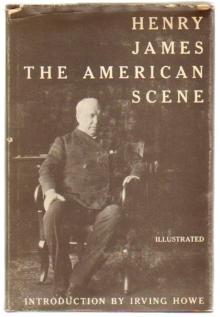 The American
The American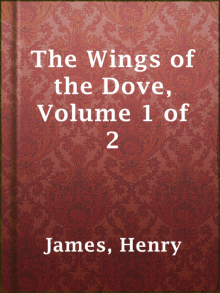 The Wings of the Dove, Volume 1 of 2
The Wings of the Dove, Volume 1 of 2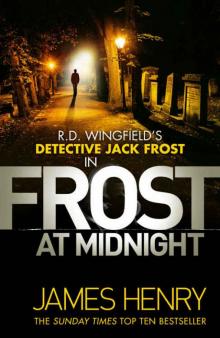 Frost at Midnight
Frost at Midnight Morning Frost
Morning Frost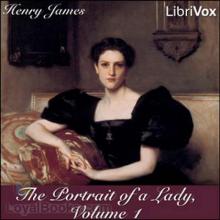 The Portrait of a Lady — Volume 1
The Portrait of a Lady — Volume 1 Fatal Frost
Fatal Frost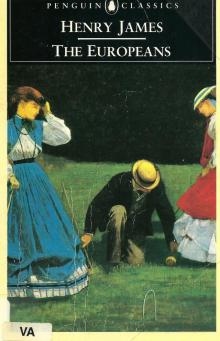 The Europeans
The Europeans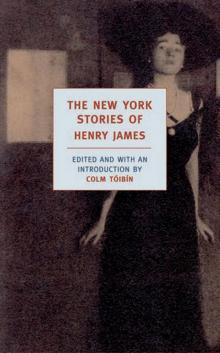 The New York Stories of Henry James
The New York Stories of Henry James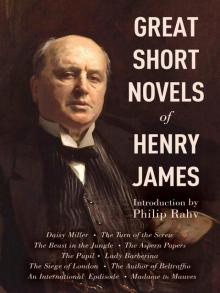 Great Short Novels of Henry James
Great Short Novels of Henry James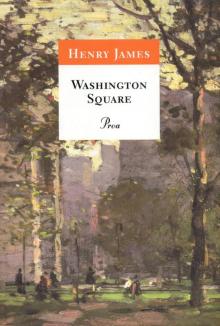 Washington Square
Washington Square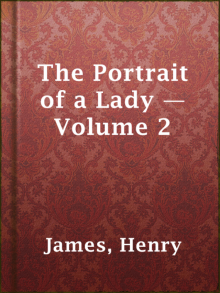 The Portrait of a Lady — Volume 2
The Portrait of a Lady — Volume 2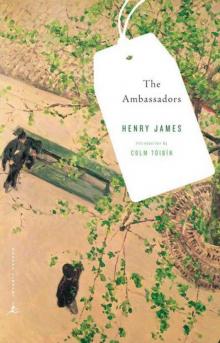 The Ambassadors
The Ambassadors The Wings of the Dove
The Wings of the Dove The Princess Casamassima (Classics)
The Princess Casamassima (Classics)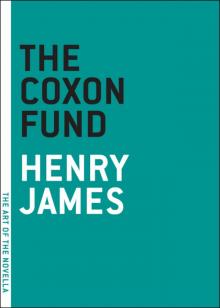 The Coxon Fund
The Coxon Fund First Frost
First Frost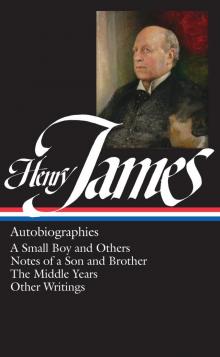 Henry James
Henry James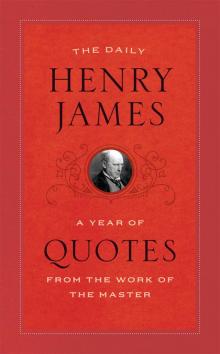 The Daily Henry James
The Daily Henry James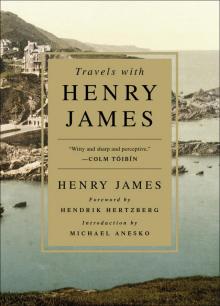 Travels With Henry James
Travels With Henry James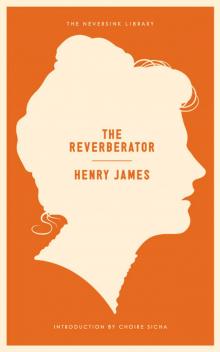 The Reverberator: A Novel
The Reverberator: A Novel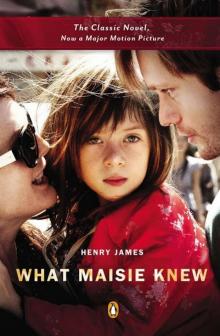 What Maisie Knew (Henry James Collection)
What Maisie Knew (Henry James Collection)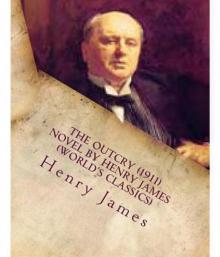 The Outcry
The Outcry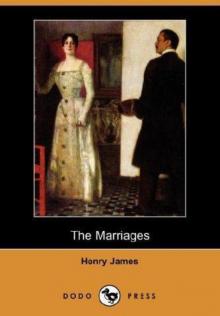 The Marriages
The Marriages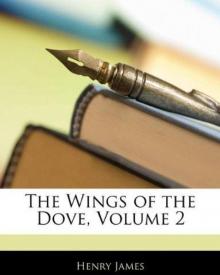 The Wings of the Dove, Volume 2
The Wings of the Dove, Volume 2 The Bostonians, Vol. I
The Bostonians, Vol. I The Outcry: -1911
The Outcry: -1911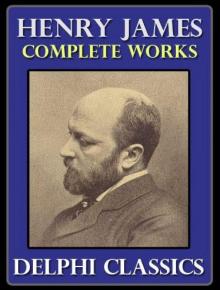 The Complete Works of Henry James
The Complete Works of Henry James Letters from the Palazzo Barbaro
Letters from the Palazzo Barbaro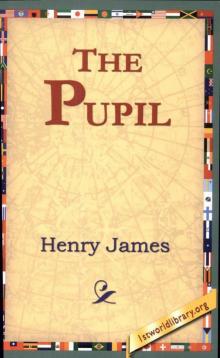 The Pupil
The Pupil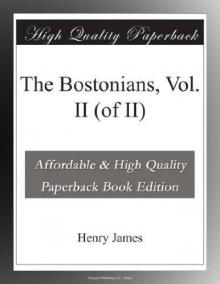 The Bostonians, Vol. II
The Bostonians, Vol. II Pandora
Pandora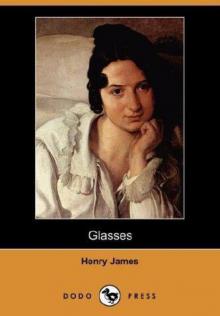 Glasses
Glasses The Princess Casamassima
The Princess Casamassima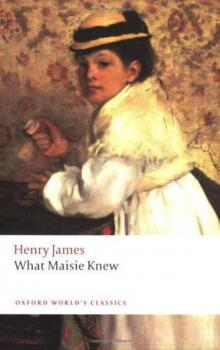 What Maisie Knew
What Maisie Knew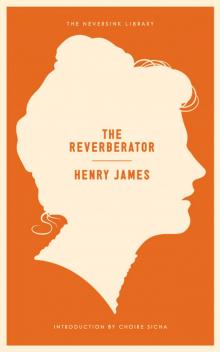 The Reverberator
The Reverberator The Golden Bowl - Complete
The Golden Bowl - Complete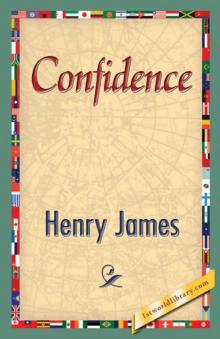 Confidence
Confidence Wings of the Dove (Barnes & Noble Classics Series)
Wings of the Dove (Barnes & Noble Classics Series) The Spoils of Poynton
The Spoils of Poynton